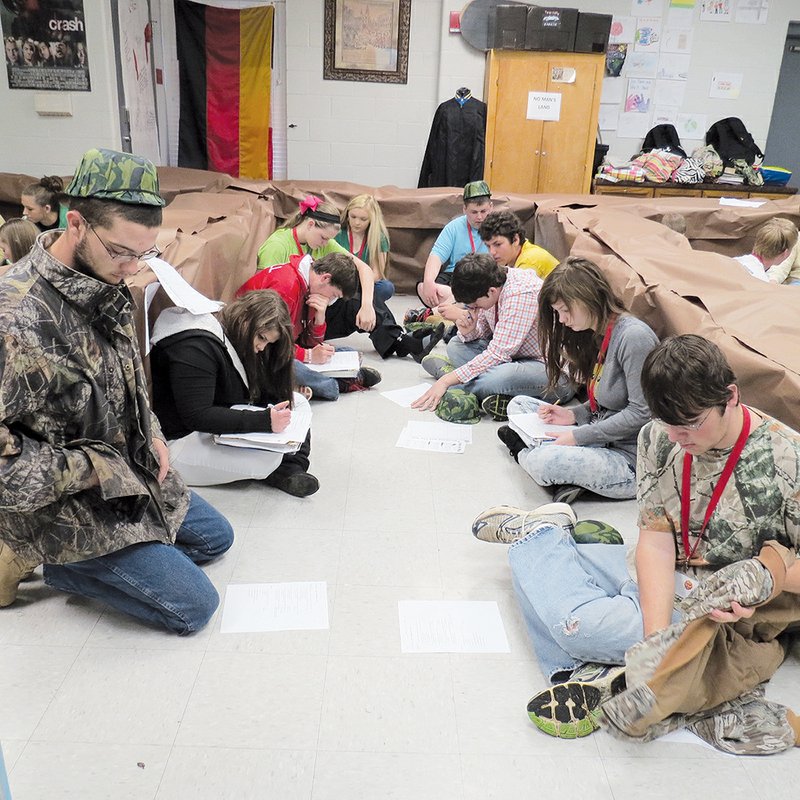VILONIA — An exercise in a sophomore world history class at Vilonia High School resulted in some students complaining about aching backs and numbness in their feet. They sat on the floor, cold, in makeshift World War I trenches for more than an hour.
“It’s interesting to hear you complain,” teacher Candace Churchwell said after about 30 minutes. “You are only getting a taste of what the soldiers endured in World War I. They sat cold and in mud-filled trenches for days on end.”
Prior to the students’ arrival, Churchwell arranged and covered desks with brown paper simulating three trenches. Filing into the room, she asked the students if they had any medical condition preventing them from sitting on the floor. A few joked with Churchwell, but none had a significant excuse. The class divided into small groups, small enough to huddle in the middle of each trench. The thermostat had been turned down earlier, allowing the room to be cooled to an uncomfortable temperature.
For the duration of the class, the students watched film strips, discussed time lines, tactics, war strategies and maneuvering from the floor position. Three students, one in each group, also wore helmets from a party shop denoting them as the commanding officers. The students huddled for group tests with the promise of a surprise for the winning team.
On one occasion, a student said, “This hurts,” referring to the sitting and crouching. Churchwell allowed the students to stand briefly for a stretch. One student suggested the soldiers should have been issued stools.
Trench warfare, which was a major topic in the class, was used on an unprecedented scale on the Western Front during World War I, Churchwell told the students. Trench warfare became necessary when the armies faced a stalemate, with neither side able to advance and overtake the other. Life in the trenches was nightmarish, aside from the usual rigors of combat, she said. Heavy rainfall flooded trenches and created impassable, muddy conditions. The mud not only made it difficult to get from one place to another; it also had other, often dire, consequences. Many times, soldiers became trapped in the deep mud and drowned.
Trench walls collapsed, rifles jammed, and soldiers fell victim to trench foot. Trench foot, she told students, is a condition similar to frostbite, developed as a result of men being forced to stand in water for days, without a chance to remove wet boots and socks.
She also told students the soldiers were in unsanitary conditions with the filth and foul odor of human waste and decaying corpses. Multitudes of rats, she said, also shared the trenches with
soldiers and, even more horrifying, fed upon the remains of the dead. Troops were also plagued with head and body lice, mites, scabies and massive swarms of flies.
If that wasn’t enough, she said, there was the deafening noise of the heavy shelling. In the midst of a heavy barrage, dozens of shells per minute might land in a trench, causing ear-splitting, deadly explosions. Many soldiers, she said, fell victim to “shell shock.” Early in the war, the term referred to what was believed to be the result of an actual physical injury to the nervous system, brought about by exposure to constant shelling. She encouraged students to do more research on the subject.
”I hope this has made an impact on you,” teacher Candace Churchwell told the students at the end of the class. “You have been good troopers today — no pun intended. This is nothing like the real thing, but it was uncomfortable for you. It’s the best I can do to let you understand how uncomfortable it was for them. As you process through this day, think about this and the sacrifices those soldiers made.”
